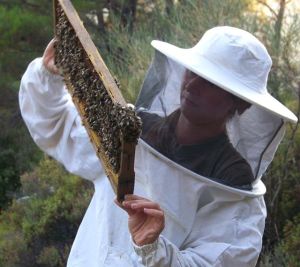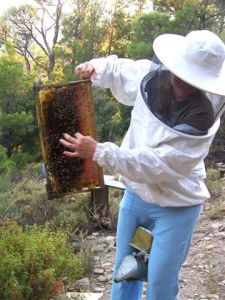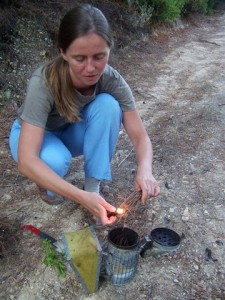A report from Xenia
I belong to the generation that grew up with Maya the Bee. Of course I don’t know whether this played a role, but I wanted to get involved in beekeeping before I moved from Athens to Ikaria. As soon as we were on the island and found an apartment, I was soon lucky enough to find a teacher. He was 76 years old at the time and had purchased his first beehive when he was 18. So someone with sufficient experience in the area. He is a calm, patient and positive person who enjoys sharing his knowledge with other people, whether they are new students or fellow beekeepers.
So he taught me his art and I helped him with his work with the bees. After about a year he gave me my first 3 beehives. After another 4 years, I now have several beehives that I can now look after on my own. But I can still get his good advice if necessary, because he has now worked as a beekeeper for 62 years and I have only worked for five. But even he says that after all these years he still finds something new when he opens this or that hive. And that’s probably the fascinating thing about beekeeping; You can always learn something new throughout your life.
Each hive is an independent society that can react in different ways to the same situation compared to other hives. What most people know is that a bee colony has a queen, drones and workers. The queen’s only job is to ensure that there are offspring. At the beginning of her life, she is fertilized by the drones during her one-time excursion and she then only lays “eggs” for the rest of her life, which lasts an average of 4-5 years. She doesn’t have to worry about her food either. She is fed by the workers. The drones, in turn, fertilize the queen and are otherwise of no use within the hive. Therefore, as soon as they have completed their task, they are chased away from the hive so that they do not eat up the valuable supplies in vain.
The workers are divided into several work groups. The new workers only have tasks within the hive for a while. They feed the queen, they look after the nymphs and they take care of the cleanliness of the hive, for example by removing dead colleagues. Another part takes care of the honey, which is initially brought into the hive in a thin form and from which liquid is gradually removed until it is thick enough to be kept. When this time is over, they can leave the hive to collect pollen and nectar. And finally, there is a part of the population that guards the entrance to the hive.
The main season in beekeeping is spring, as this is the time of year when new bee colonies develop, with many hives raising new queens, each of which then takes part of the colony and honey with them and leaves the hive in search of a new home. The beekeeper’s job is then to capture these swarms of bees and place them in a new hive.
One of the most common questions I get asked, especially in Greece, is whether the bees don’t sting. The answer is that of course they sometimes sting, but on the one hand you get used to it, and on the other hand the poison from the bees is actually healthy and beekeepers don’t get rheumatism because of it.
Beekeeping is therefore also a challenge and a lesson in becoming calmer and more careful, because if you are hectic and stressed with the bees, they let you know immediately by first starting to buzz louder and then when you do, they still don’t has understood, they also start to sting. So it’s important to carry out checks or interventions not only in the right weather, but also in the right mood. And if you weren’t a quiet person before, you will become one over time if you want to deal with the bees correctly and respectfully.




